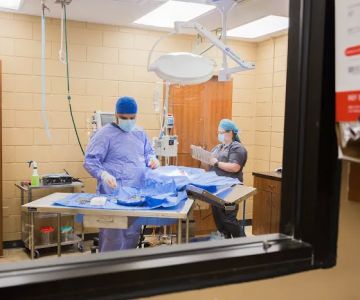Can a Veterinary Clinic Be in an Office Building? Exploring the Pros and Cons
When planning to open a veterinary clinic, one of the most important considerations is location. Many people automatically think of standalone buildings or dedicated medical spaces when envisioning a veterinary clinic, but is it possible to run a veterinary practice in an office building? As a veterinarian, this is a question I had to ask myself when starting my own practice. In this article, I’ll explore the feasibility of setting up a veterinary clinic in an office building, the benefits, and the challenges that come with such a decision.
1. Understanding the Basics of Setting Up a Veterinary Clinic
Before diving into whether an office building is a suitable option for a veterinary clinic, it’s important to understand the fundamental requirements for a veterinary practice. A veterinary clinic must provide specialized care to animals, which involves specific needs such as space for examination rooms, treatment areas, surgical suites, and often overnight boarding. Unlike standard office spaces, a veterinary clinic must be equipped to handle both routine and emergency medical procedures, as well as the safe housing of animals.
These requirements include plumbing for clean water, proper waste disposal, space for medical equipment, and a layout that facilitates the movement of animals and people within the facility. Additionally, considerations for patient comfort and infection control must also be factored in. While office buildings may seem like a cost-effective option, they may not always meet the needs of a veterinary clinic without significant modifications.
2. The Pros of Setting Up a Veterinary Clinic in an Office Building
There are several potential benefits to setting up a veterinary clinic in an office building. Let’s explore some of the most compelling reasons why it could be a viable option.
Cost-Effective Option
One of the primary advantages of choosing an office building for your veterinary practice is the lower initial investment compared to custom-built veterinary facilities. Office spaces, especially in areas where real estate prices are high, may offer more affordable rent or purchase options than a standalone veterinary building. Office buildings in commercial zones may also have pre-existing infrastructure, such as electrical systems, ventilation, and plumbing, which could save on renovation costs.
Proximity to Other Businesses
Being in an office building may also offer your clinic a strategic location within a commercial hub. Many office buildings are located in areas with high foot traffic or near complementary businesses such as pet stores, grooming salons, or even other medical facilities. This can make it easier for clients to access your services and potentially increase your patient base due to the convenience of your location.
Flexibility of Space Layout
Office buildings often offer flexibility in how the space is used. You may be able to design the layout of your clinic according to your specific needs, whether it’s for patient examination rooms, a reception area, or administrative offices. This adaptability can help you create an environment that maximizes efficiency and patient care.
3. The Challenges of Setting Up a Veterinary Clinic in an Office Building
While there are advantages to operating a veterinary clinic in an office building, there are also some significant challenges. It’s important to consider these factors to ensure that the location will meet both your needs and the needs of your patients.
Space Constraints
One of the most significant challenges of setting up a veterinary clinic in an office building is the potential for space limitations. Veterinary practices require specialized areas, such as examination rooms, surgical suites, recovery areas, and even specialized areas for housing animals overnight. Office buildings may not always provide enough room to accommodate these areas without substantial renovations. Moreover, the space layout may not lend itself to efficient patient flow, potentially creating bottlenecks or limiting your ability to expand as your practice grows.
Noise and Distractions
Veterinary clinics can often be noisy due to barking dogs, meowing cats, and the sounds of medical equipment. This can be a challenge in an office building, where other tenants may not expect or appreciate the noise. Managing noise levels to avoid disturbing other businesses in the building could require additional soundproofing and careful planning. Additionally, having animals in close proximity to office workers or other businesses could lead to unwanted distractions or issues with animal allergies.
Zoning and Compliance
Before setting up a veterinary clinic in an office building, it’s essential to research zoning regulations and ensure that the space is compliant with local laws for animal healthcare facilities. Some areas may have restrictions on what types of businesses can operate in office buildings, especially when it involves animal care. You’ll need to check with local zoning boards and possibly make modifications to meet the specific requirements for a veterinary practice.
4. How to Make It Work: Modifying an Office Building for a Veterinary Clinic
If you’ve decided that an office building is the right location for your veterinary clinic, there are several steps you can take to ensure that the space is suitable for animal care. Here are some tips for modifying the office space to meet your needs:
- Renovate for Proper Ventilation: Proper airflow is essential for maintaining a clean and safe environment. You may need to install specialized HVAC systems designed for medical and veterinary use.
- Ensure Adequate Space for Animal Care: Plan out separate areas for different aspects of the clinic, including exam rooms, a waiting area, a surgical suite, and recovery areas. Consider the flow of animals and people to minimize stress.
- Soundproofing and Privacy: Installing soundproofing materials can help reduce noise and ensure that your patients’ visits are more comfortable. Privacy for both animal patients and clients is also essential for trust and comfort.
- Compliance with Veterinary Standards: Ensure that the space meets the necessary legal and professional standards for sanitation, waste disposal, and animal care regulations.
5. Conclusion: Making the Right Decision for Your Veterinary Clinic
In conclusion, while setting up a veterinary clinic in an office building may seem like an unconventional choice, it can be a practical and cost-effective solution if done thoughtfully. The key is ensuring that the space can be modified to meet the unique needs of a veterinary practice. By considering space requirements, noise levels, zoning regulations, and the potential for expansion, you can determine if an office building is the right fit for your veterinary clinic.
Ultimately, the success of your veterinary clinic depends on the quality of care you provide and how well you can adapt to the specific challenges of your location. If you’re considering opening a veterinary practice, whether in an office building or elsewhere, make sure to take the time to research your options thoroughly and plan carefully to ensure the long-term success of your business.











